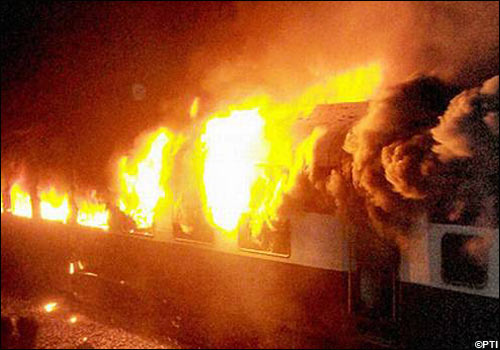
Chennai/Hyderabad, July 30: At least 35 passengers were killed and 25 injured when a coach of the Delhi-Chennai Tamil Nadu Express caught fire near Nellore in Andhra Pradesh early Monday, officials said.
The fire broke out around 5.30 a.m. in the S-11 compartment, minutes after the Chennai-bound train left Nellore railway station in south coastal Andhra Pradesh, about 450 km from Hyderabad.
The death toll may go up as a total of 72 passengers were travelling in the second class reserved compartment. "More than 35 passengers are dead and 25 are injured. The injured have been admitted in hospitals," B. Rami Reddy, district revenue officer and additional district magistrate at Nellore, told IANS over phone.
While 15 passengers are believed to have jumped down from the burning compartment, there was no official word about others. A senior Southern Railway official told IANS in Chennai: "A train carrying the relatives of those travelling in the S-11 coach of the Tamil Nadu Express will leave Chennai Central at 9.30 a.m. The train will bring back the affected the passengers from Nellore."
The list of passengers travelling in the S-11 coach of Tamil Nadu Express has been pasted at the Chennai Central station, added the official. Senior railway officials from Chennai are rushing to Nellore. Nellore district collector B. Sreedhar is overseeing the rescue operations.
A witness told reporters that many were trapped inside when the flames engulfed the compartment. "I was lucky to come out but many passengers could not escape as two doors were jammed and the smoke spread fast," said Sudhir.
Fire fighting personnel extinguished the fire and rescue workers were using gas cutters and other equipment to retrieve the bodies. Ambulances were pressed into service to shift the injured to hospital.
The district collector said the burning bogie was detached to prevent the fire from spreading to other compartments. He quoted some witnesses as saying that the fire was caused by short circuit near the toilet.
As the train was not moving at full speed, some passengers either entered the adjoining compartment or jumped down. However, those sleeping on the upper berths could not escape as the smoke spread fast leaving the doors jammed.
Some trains bound for Chennai were delayed.






Comments
Add new comment